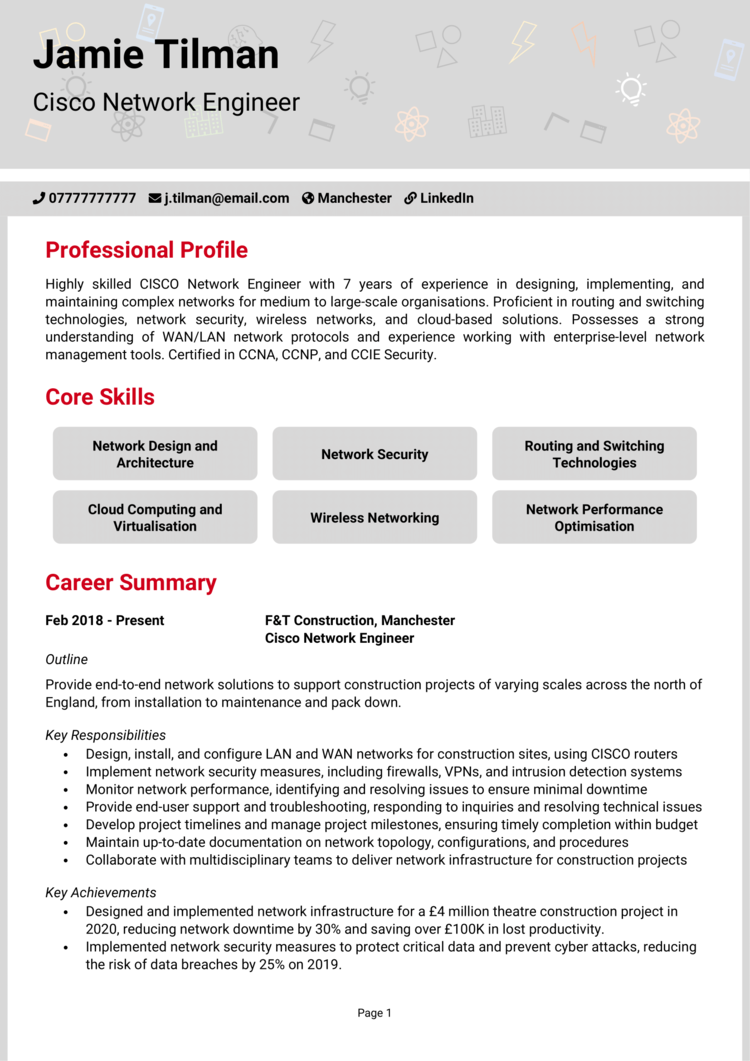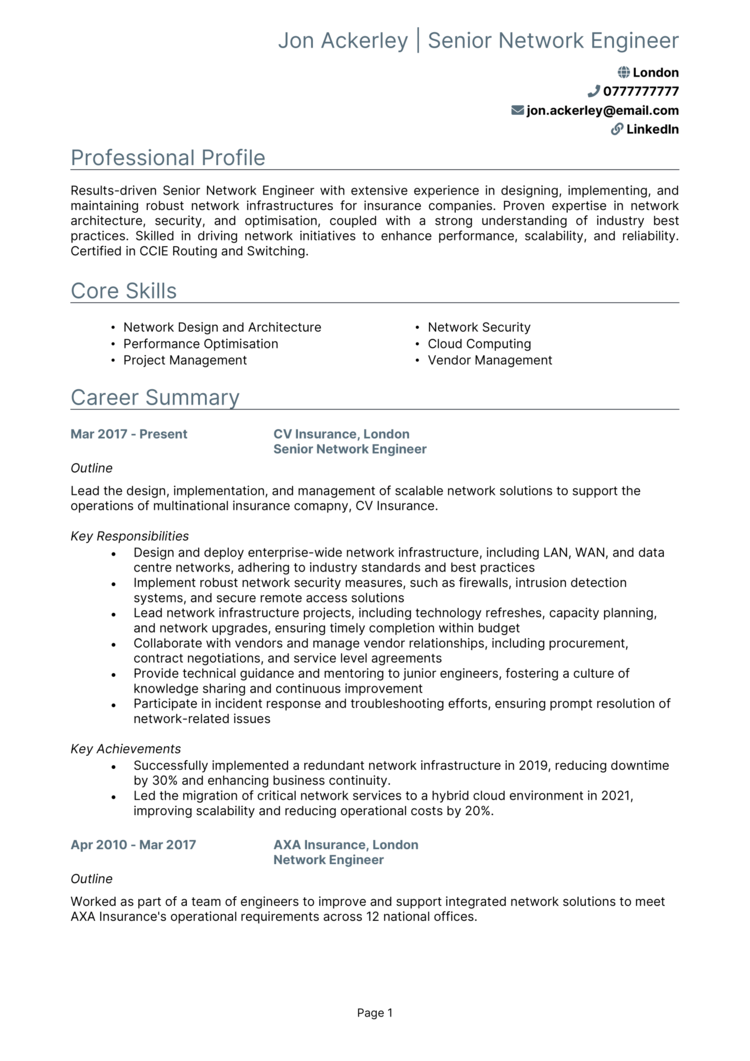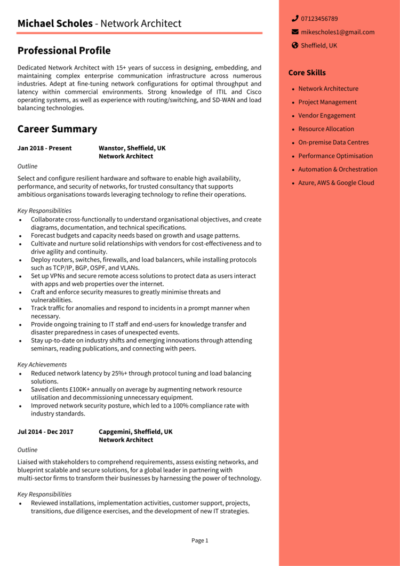A strong network keeps businesses running, but before you can configure routers and troubleshoot outages, you need to ensure your CV is running smoothly – no packet loss, no downtime.
Employers aren’t just looking for someone who can ping a server; they want a problem-solver who keeps the whole system running: these Network Engineer CV examples and writing guide will craft CV that stands out in a competitive field.
Network Engineer CV

Cisco Network Engineer CV

Senior Network Engineer CV

Network Administrator CV

Junior Network Engineer CV

Network Support Engineer CV

How to write your Network Engineer CV
Learn how to create your own interview-winning Network Engineer CV with this simple step-by-step guide.
Just like a poorly configured network can slow down an entire system, writing a badly structured CV can keep recruiters from seeing your true value. A network engineer’s CV should be clean, well-organised, and easy to scan – just like any optimised IT infrastructure.
This guide covers everything from structuring your CV correctly to presenting your technical expertise in the best way. By the time you’re done, you’ll have an application that proves you don’t just build strong networks – you build strong career opportunities.
How to create a good structure for your Network Engineer CV


IT recruiters don’t have time to sift through unnecessary details (if they wanted to troubleshoot a confusing layout, they’d be fixing network issues, not reading CVs). They need to quickly assess whether you have the right technical skills and certifications: a coherent CV structure helps them do just that.
Here’s how to organise your CV layout effectively:
- Name and contact details – Place personal details at the top so hiring managers can easily reach you. A photo of yourself is always optional.
- Profile – Open with a concise summary that highlights your networking expertise, problem-solving skills, and key achievements.
- Core skills – Provide a snapshot of your most relevant technical skills, such as network security, troubleshooting, or cloud networking.
- Work experience – Detail your previous roles in reverse chronological order, focusing on the impact you had in each role.
- Education – List your academic qualifications, starting with the most recent.
- Additional info – Optionally, include hobbies, technical projects, or relevant industry memberships and awards.
Network Engineer CV format


A professional, well-structured CV format mirrors the precision and organisation required in network engineering. If recruiters struggle to find key details, they might assume your troubleshooting skills aren’t up to par, and even the best IT professionals will lose out over formatting mistakes.
Follow these formatting tips and guidelines:
- Bullet points – Use them to clearly present skills, responsibilities, and achievements.
- Divide sections – Structure your CV logically so information is easy to locate.
- Use a clear and readable font – Keep it professional and ensure readability, making sure your font is 10pt to 13pt.
- No more than 2 pages – Keep your CV concise enough to engage the reader, and long enough to ensure you highlight key experience and certifications.
Writing a Network Engineer CV profile


Your CV profile is your introduction to employers, giving them a quick overview of your networking expertise and professional strengths. This short section at the top of your CV should be tailored to each role, ensuring it aligns with the employer’s needs, and telling them how and why you’d provide value to their company.
Network Engineer CV profile examples
Profile 1
Detail-oriented Network Engineer with four years of experience designing, implementing, and maintaining secure and scalable network infrastructures. Skilled in configuring routers, switches, and firewalls, with expertise in Cisco, Juniper, and Palo Alto technologies. Proficient in troubleshooting network performance issues and optimising system reliability. Passionate about enhancing connectivity and cybersecurity in enterprise environments.
Profile 2
Proactive Network Engineer with three years of experience in supporting and troubleshooting LAN, WAN, and cloud networking solutions. Skilled in network monitoring, incident response, and firewall administration. Experienced in using tools like Wireshark, SolarWinds, and Cisco Packet Tracer. Dedicated to improving network security, performance, and resilience.
Profile 3
Experienced Network Engineer with over six years of expertise in enterprise network architecture, focusing on designing high-availability solutions and implementing automation for efficiency. Adept at working with SD-WAN, VPN, and wireless networks. Proficient in scripting with Python for network automation and monitoring. Passionate about optimising infrastructure for scalability and security.
What to include in your Network Engineer CV profile
A strong profile should include:
- Your networking experience – Have you worked in enterprise networks, data centres, or cloud infrastructure?
- Key technical skills – Highlight your strengths in areas like network security, infrastructure design, or performance optimisation.
- Certifications – If you have qualifications like CCNA, CCNP, or AWS, mention them here.
- Problem-solving abilities – Networking is all about troubleshooting and efficiency – showcase your ability to resolve complex issues.
- Scalability and security expertise – Employers want engineers who build networks that are secure, scalable, and future-proof.
How to present your core skills section properly


A core CV skills section allows recruiters to quickly assess whether your technical expertise matches the job requirements. Since network engineering covers a broad range of responsibilities, this section should be tailored to the specific role you’re applying for.
If the job focuses on security, highlight firewall management and intrusion detection. If it’s a cloud networking role, mention cloud-based infrastructure and virtualisation. Adjust your skills to align with the job description to make your CV as relevant as possible.
Top skills for your Network Engineer CV
- Network Design and Architecture – Planning and implementing scalable network infrastructures to support business operations.
- Routing and Switching – Configuring and managing routers and switches using protocols like OSPF, BGP, and VLANs.
- Firewall and Security Management – Implementing firewalls, VPNs, and intrusion prevention systems to protect network integrity.
- Wireless Network Administration – Setting up and optimising Wi-Fi networks for secure and high-performance connectivity.
- Cloud Networking – Managing network services on cloud platforms like AWS, Azure, or Google Cloud.
- Troubleshooting and Diagnostics – Identifying and resolving network performance issues using tools like Wireshark and PRTG.
- VoIP and Unified Communications – Configuring voice-over-IP systems and integrating communication solutions.
- Network Automation – Using scripting languages like Python or Ansible to automate network configurations and management.
- Disaster Recovery and Redundancy – Implementing backup strategies and failover mechanisms to ensure business continuity.
- Compliance and Regulatory Standards – Ensuring adherence to industry protocols such as ISO, NIST, and GDPR for network security and data protection.
Work experience


A network engineer’s job is all about maintaining efficiency, security, and reliability. Your work experience should reflect this by highlighting how you’ve improved or maintained networking infrastructure in past roles.
List your experience in reverse chronological order, focusing on your contributions to system stability, network performance, and troubleshooting efficiency. If you’ve led a migration to cloud networking, implemented a new security protocol, or reduced downtime, highlight these achievements.
Formatting your job history for your CV

- Outline – Introduce the company, the industry, and your role within the IT team.
- Responsibilities – List your primary tasks, such as network troubleshooting, system monitoring, or security audits. Use power words like “configured”, “deployed”, and “optimised”.
- Achievements – Provide measurable results where possible. If you reduced downtime, improved security, or optimised performance, show the numbers – think of it like network metrics, but for your career.
Example job entries for a Network Engineer CV
Network Engineer | TechNet Solutions
Outline
Designed and maintained secure and scalable network infrastructure for enterprise clients, ensuring high availability and optimal performance.
Responsibilities
- Configured and managed Cisco and Juniper routers, switches, and firewalls.
- Monitored and troubleshot network performance using Wireshark and SolarWinds.
- Implemented VLANs, VPNs, and security protocols to enhance network security.
- Collaborated with IT teams to ensure seamless network integration across departments.
- Documented network configurations and provided training to junior engineers.
Achievements
- Reduced network downtime by 30 percent through proactive monitoring and issue resolution.
- Improved network security by implementing firewalls and access control policies.
- Successfully designed and deployed a scalable SD-WAN solution, enhancing connectivity.
Network Support Engineer | SecureNet Ltd
Outline
Provided technical support and troubleshooting for network-related issues within a managed IT services company, ensuring seamless connectivity and minimal downtime for business clients.
Responsibilities
- Diagnosed and resolved network outages, working with ISPs and internal IT teams.
- Configured and maintained wireless access points, firewalls, and network devices.
- Monitored network health using SNMP-based tools and provided proactive maintenance.
- Assisted in network upgrades, including hardware replacements and software patches.
- Maintained detailed logs and reports on network performance and incidents.
Achievements
- Resolved 90 percent of network issues within SLA targets, improving IT response times.
- Enhanced Wi-Fi network performance by optimising access point placement.
- Recognised for improving internal documentation to streamline troubleshooting.
Senior Network Engineer | EnterpriseCom Ltd
Outline
Led the design and deployment of enterprise-grade network solutions within a multinational corporation, ensuring performance, security, and scalability across multiple locations and data centres.
Responsibilities
- Architected and implemented LAN, WAN, and cloud networking solutions for global operations.
- Developed network automation scripts using Python to optimise configuration processes.
- Led security audits and implemented firewall policies to enhance data protection.
- Collaborated with DevOps teams to integrate networking with cloud-based applications.
- Managed vendor relationships and evaluated new networking technologies for deployment.
Achievements
- Reduced network latency by 40 percent by optimising traffic flow and routing protocols.
- Automated configuration processes, reducing manual workload by 50 percent.
- Successfully deployed a hybrid cloud network solution, improving operational efficiency.
Education section


While practical experience is often more valuable in network engineering, a strong education background can still boost your credibility and give you an edge. If you have a degree in Computer Science, Information Technology, or a related field, list it here.
If you’re early in your career, highlight any coursework or projects that demonstrate your networking skills, such as system administration labs, cybersecurity projects, or cloud computing assignments. List qualifications the one you earned most recently at the top.
Best qualifications for Network Engineers
- Cisco Certified Network Associate (CCNA) – A widely recognised certification that validates networking fundamentals.
- Cisco Certified Network Professional (CCNP) – A higher-level certification for those with experience in networking.
- CompTIA Network+ – A vendor-neutral certification covering networking concepts, troubleshooting, and security.
- AWS Certified Advanced Networking – Specialty – Ideal for engineers working with cloud-based networking infrastructure.
- Certified Information Systems Security Professional (CISSP) – A strong choice for network engineers focusing on security.





